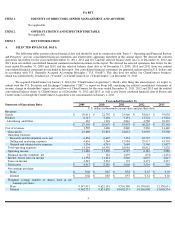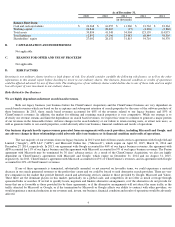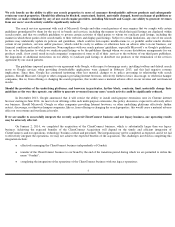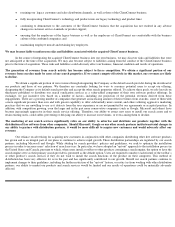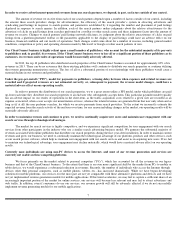Incredimail 2013 Annual Report Download - page 17
Download and view the complete annual report
Please find page 17 of the 2013 Incredimail annual report below. You can navigate through the pages in the report by either clicking on the pages listed below, or by using the keyword search tool below to find specific information within the annual report.
Under current Israeli law, we may not be able to enforce non-
competition covenants and, therefore, may be unable to prevent our
competitors from benefiting from the expertise of some of our former employees.
We have entered into non-
competition agreements with most of our professional employees. These agreements prohibit our employees,
if they cease working for us, from competing directly with us or working for our competitors for a limited period. Under current Israeli law, we
may be unable to enforce these agreements, in whole or in part, and it may be difficult for us to restrict our competitors from gaining the
expertise that our former employees gained while working for us. For example, Israeli courts have required employers seeking to enforce non-
compete undertakings of a former employee to demonstrate that the competitive activities of the former employee will harm one of a limited
number of material interests of the employer which have been recognized by the courts, such as the secrecy of a company’
s confidential
commercial information or its intellectual property. If we cannot demonstrate that harm would be caused to us, we may be unable to prevent our
competitors from benefiting from the expertise of our former employees.
Our international operations involve special risks that could increase our expenses, adversely affect our operating results and require
increased time and attention of our management.
We derive and expect to continue to derive a substantial portion of our revenues from users outside the United States. Our international
sales and related operations are subject to a number of inherent risks, including risks with respect to:
Risks Related to Our In
tellectual Property
Unlawful copying of our products or other third party violations of existing legal protections or reductions in the legal protection for
intellectual property rights of software developers or use of open source software could adversely affect our distribution and revenue.
The software products that we sell incorporate a technology that reduces the ability of third parties to copy the software without having
paid for it. In addition, certain of our products may now or in the future incorporate open source software, which may obligate us to pass on to
our licensees — at no cost—
the rights to use, copy, modify, and redistribute the underlying code. Use of open source software, unlicensed
copying and use of software and intellectual property rights lead to a loss of potential users and revenue to us, which could be more significant in
countries where laws are less protective of intellectual property rights. Continued educational and enforcement efforts by governmental
authorities may not adequately address this problem, and further deterioration in compliance with existing legal protections or reductions in the
legal protection for intellectual property rights of software developers could adversely affect our revenue.
•
potential loss of proprietary information due to piracy, misappropriation or laws that may be less protective of our intellectual
property rights than those of the United States;
•
costs and delays associated with translating and supporting our products in multiple languages;
•
foreign exchange rate fluctuations and economic instability, such as higher interest rates and inflation, which could make our
products more expensive in those countries;
•
costs of compliance with a variety of laws and regulations;
•
restrictive governmental actions such as trade restrictions;
•
limitations on the transfer and repatriation of funds and foreign currency exchange restrictions;
•
compliance with different consumer and data protection laws and restrictions on pricing or discounts;
•
lower levels of adoption or use of the Internet and other technologies vital to our business and the lack of appropriate
infrastructure to support widespread Internet usage;
•
lower levels of consumer spending on a per capita basis and fewer opportunities for growth in certain foreign market segments
compared to the United States;
•
lower levels of credit card usage and increased payment risk;
•
changes in domestic and international tax regulations; and
•
geopolitical events, including war and terrorism.
13


